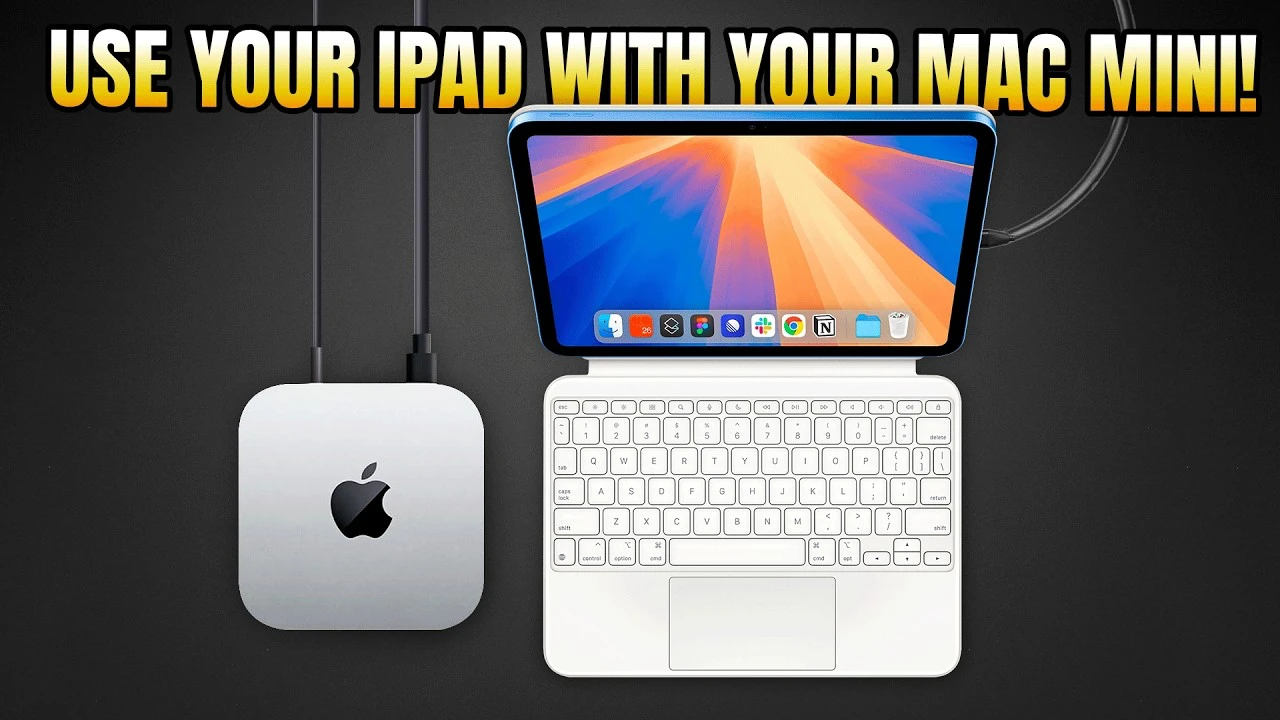In today’s fast-paced digital landscape, the ability to seamlessly integrate your devices can significantly boost productivity and convenience. One such integration is transforming your iPad into a display for your Mac Mini. This innovative setup offers a unique blend of flexibility and portability, allowing you to maximize your workspace and efficiency. In the video below, Matt Talks Tech explores three distinct methods to achieve this setup, detailing the required equipment and step-by-step instructions for each approach. Additionally, we will examine the current limitations of these configurations and discuss potential enhancements that could further optimize the user experience.
Method 1: Leveraging an Additional Monitor Setup
The first method involves using an additional monitor alongside your iPad to create a multi-display setup with your Mac Mini. To get started, you will need the following equipment:
- A Mac Mini
- An extra monitor
- Your iPad
Once you have gathered the necessary components, you can proceed to connect the devices using either AirPlay or screen mirroring technology. This will allow you to extend your Mac Mini’s display across both the additional monitor and your iPad, providing a larger and more versatile workspace.
However, it is important to note that this method has its drawbacks. One significant limitation is that the iPad’s built-in trackpad is not functional in this setup. As a result, you will need to use a separate mouse and keyboard to navigate and interact with your Mac Mini’s interface on the iPad display.
Method 2: Utilizing a USB-C to HDMI Adapter
The second method for transforming your iPad into a Mac Mini display involves using a USB-C to HDMI video capture adapter in conjunction with the Orion app. This approach allows you to connect your iPad directly to your Mac Mini via an HDMI connection, allowing you to mirror your Mac Mini’s display on your iPad.
To set up this configuration, follow these steps:
- Connect the USB-C end of the adapter to your iPad.
- Connect the HDMI end of the adapter to your Mac Mini.
- Launch the Orion app on your iPad.
- Configure the app settings to mirror your Mac Mini’s display.
While this method effectively turns your iPad into a secondary display for your Mac Mini, it also has limitations similar to the first method. The iPad’s trackpad remains non-functional, requiring you to use a separate mouse and keyboard for input and navigation.
Method 3: Implementing a Hybrid Dual iPad Setup
For those seeking a truly unique and innovative solution, the hybrid dual iPad setup offers an intriguing option. This method employs two iPads in conjunction with the Orion app to create a seamless display and input system for your Mac Mini.
Here’s how it works:
- One iPad is used to mirror your Mac Mini’s display, providing a secondary screen for your workspace.
- The second iPad serves as a dedicated input device, allowing you to interact with your Mac Mini using touch controls and gestures.
To set up this configuration, you will need to install the Orion app on both iPads and follow the app’s instructions for connecting them to your Mac Mini. While this setup offers a novel and efficient way to integrate your iPads with your Mac Mini, it still requires the use of additional peripherals, such as a keyboard, for full functionality.
Addressing Current Limitations and Future Enhancements
Despite the practicality and flexibility offered by these methods, there are currently some limitations that users should be aware of. One notable drawback is the lack of support for the iPad’s built-in trackpad and full keyboard functionality when used as a display for the Mac Mini.
These limitations highlight the need for future updates and improvements from Apple to enhance the integration between the Mac Mini and iPad. By addressing these compatibility issues and expanding the functionality of these setups, Apple could significantly improve the user experience for those seeking to transform their iPads into Mac Mini displays.
Some potential enhancements that could greatly benefit users include:
- Native support for the iPad’s trackpad and keyboard when used as a Mac Mini display
- Improved performance and reduced latency for screen mirroring and display extension
- Streamlined setup processes and intuitive user interfaces for configuring these setups
As Apple continues to innovate and refine its ecosystem of devices, it is essential to prioritize seamless integration and cross-device functionality. By addressing the current limitations and implementing these suggested enhancements, Apple can empower users to create truly efficient and versatile workspaces that leverage the full potential of their iPads and Mac Minis.
Summary
Transforming your iPad into a Mac Mini display offers a range of benefits, including increased flexibility, portability, and productivity. By exploring the three methods outlined in this guide – using an additional monitor setup, employing a USB-C to HDMI adapter, or implementing a hybrid dual iPad configuration – you can find the approach that best suits your needs and preferences.
However, it is crucial to acknowledge the current limitations of these setups, particularly the lack of support for the iPad’s trackpad and full keyboard functionality. As we look to the future, it is essential for Apple to prioritize enhancing the compatibility and functionality between the Mac Mini and iPad, allowing users to create truly seamless and efficient workspaces.
By encouraging Apple to address these limitations and implement the suggested enhancements in future updates, we can pave the way for a more user-friendly and optimized experience for those seeking to transform their iPads into powerful and versatile Mac Mini displays.
Source & Image Credit: Matt Talks Tech
Filed Under: Apple, Apple iPad, Guides
Latest TechMehow Deals
Disclosure: Some of our articles include affiliate links. If you buy something through one of these links, TechMehow may earn an affiliate commission. Learn about our Disclosure Policy.
